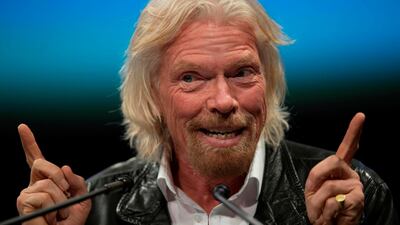Richard Branson’s plan to list his Virgin Galactic space business will test the pioneering venture before it even attempts to launch its first paying customers into orbit.
Virgin Galactic is set to become the world’s first publicly traded space-tourism business, through a merger with a US investment firm. Would-be shareholders will have to weigh the sector’s huge potential against the risks.
While hundreds have signed up for the first flights, which will cost from $250,000 each (Dh918,125), the price will have to come down in order to attract the millions of people that Mr Branson says would ultimately want to take trips to the edge of space. The sweet spot for mass consumer adoption would be $50,000, according to Bank of America Merrill Lynch.
There’s also the fatal crash in 2014 that almost led Mr Branson to can the venture. Another calamity would likely lead to its termination.
The nature of the Virgin Galactic listing hints at the concerns. Mr Branson eschewed an initial public offering for a merger with Social Capital Hedosophia (SCH), a shell company that trades on the New York Stock Exchange and has been sitting on a cash pile it must use by September to avoid having to return it to investors.
A bet on Virgin Galactic would also represent a gamble on Mr Branson beating formidable rivals in the shape of Amazon.com founder Jeff Bezos and Tesla’s Elon Musk in the race to send customers into space.
The wider space industry could grow to $805 billion by 2030 from $244bn in 2010, according to UBS analysts, with tourist trips like those planned by Mr Branson valued at more than $3bn. The use of sub-orbital flights to slash long-haul travel times, which Virgin Galactic is also targeting, could be worth much more at $20bn a year, assuming the technology captures about 5 per cent of the market, they estimate.
The company holds more than $80 million in deposits from about 700 customers ready to take a 90-minute journey to the edge of space, allowing them to experience weightlessness and see the curvature of the Earth.
Mr Branson, 68, founded Virgin Galactic in 2004. His spacecraft operate like planes rather than reusable rockets, conveying what he considers to be an advantage because they could also potentially access aviation markets.
“Virgin Galactic is very far ahead in terms of where their technology sits,” said Northern Sky Research analyst Dallas Kasaboski. “But the market is still embryonic and faces the risks of logistical roadblocks and unexpected costs.”
The space-tourism market will initially be dwarfed by related sectors such as satellite communications, projected to be worth about $10bn annually, and Earth observation, at about $3bn, Mr Kasaboski said, though it could open up following “customer validation”.
Whether Virgin Galactic could have achieved a successful flotation by itself, convincing banks to underwrite an IPO and institutions and the public to buy shares, is unclear. The company has raised more than $1bn, initially from Mr Branson, with an Abu Dhabi's Mubadala Investment Company taking a stake in 2010.
SCH raised its funds two years ago and its investors only now know where their cash is being deployed.
The US firm will have a 49 per cent stake in the combined business, according to a statement Tuesday. That will raise about $800m for Virgin Galactic, with SCH founder, Sri Lanka-born Chamath Palihapitiya, contributing $100m and becoming chairman of the combined company.
The initial stock reaction to the merger plan was muted, with up 3.5 per cent to $10.825 as of 9:41am in New York on Tuesday. The shares have hovered around $10 since they were listed almost two years ago as the company mulled its investment options, giving a market value of about $900m.
Mr Branson said Virgin has made “great progress” in its test programme, allowing it to “open space to more investors and thousands of new astronauts”.
About 2,500 more have expressed an interest in becoming customers, and that’s “just the first two or three years of the business”, said Mr Palihapitiya. He added that he was attracted by Virgin Galactic because it promises the margins of a software company, a sector he knows well after working at Facebook, and could follow a growth trajectory similar to Tesla.
The share sale will help fund Virgin Galactic until its spaceships can operate and generate a profit, which Mr Palihapitiya said is being targeted for August 2021. Commercial flights will start within a year from now and hypersonic trips, allowing any two points on Earth to be linked within a few hours, are a five to 10-year project, he said.
Mr Branson said in December that he expected to make his own first flight some time in 2019, paving the way for trips involving commercial clients. Virgin Galactic is meanwhile moving 100 staff to an operational base in New Mexico from a California test center, along with the spaceship VSS Unity, which will undertake final test flights before full services commence.

